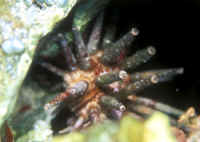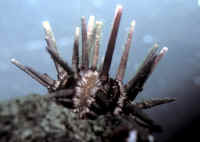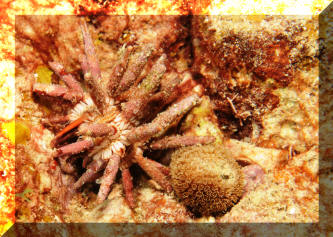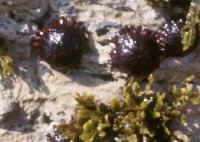|
Related FAQs: Sea
Urchins, Urchins 2, Urchins 3, Urchin Identification, Urchin Behavior, Urchin Compatibility, Urchin Selection, Urchin System, Urchin Feeding, Urchin Disease, Urchin Reproduction,
Related Articles: Echinoderms, An Introduction to the
Echinoderms: The Sea Stars, Sea Urchins, Sea Cucumbers and
More... By James W. Fatherree, M.Sc. Algae Control, Nutrient Control and
Export,
/A Diversity of Aquatic
Life
Some Spines
Now! Sea Urchins (and Sand Dollars), the Echinoids, Pt. 3
To:
Part 1, Part
2, Part 4,
Part 5, Part 6
|
|
|
By Bob Fenner
|
|
Genus Echinothrix:
| Echinothrix calamaris (Pallas 1774), the
Hatpin Urchin. Indo-Pacific; Red Sea to Hawai'i. Should be kept
singly and may prey on Cnidarian livestock. Need large spaces in
rock to hide amongst by day and coarse substrate. Hawai'i,
Cebu, Philippines and N. Sulawesi images. |
Family Cicaridae:
Genus Chondrocidaris:
| Chondrocidaris gigantea, A. Agassiz 1863,
the Rough-Spined Urchin. Dark Larger outer spines covered with
fouling organisms (algae, sponges, bryozoans...). Relatively short,
secondary spines are clean. Hawai'i and New Caledonia at depths
of usually 30 meters plus. Hawai'i pix. |
 
|
Bigger PIX:
The images in this table are linked to large
(desktop size) copies. Click on "framed" images to go to
the larger size. |
|
%20MD.JPG)

|
Genus Eucidaris:
| Eucidaris thouarsii
(Valenciennes 1846), Slate Pencil Urchin. Family Cidaridae. To 10.2
inches in diameter. Sea of Cortez to Ecuador and Galapagos Islands.
Ten rows of 5-8 variously sharp/dull club-like spines. Feeds on
benthic algae and Pocillopora and Pavona corals.
Common in the Galapagos. Found on rocky shore shallows to 150
meters depth. Galapagos pic. |

|
Bigger PIX:
The images in this table are linked to large
(desktop size) copies. Click on "framed" images to go to
the larger size. |
|
%20MD.JPG)
|
| Eucidaris tribuloides (Lamarck 1816), Mine,
Pencil, Club Urchin. Tropical West Atlantic. Solitary, hiding by
day. Live on algae, bryozoans, sponges, tunicates in the wild.
Algae and opened shellfish in captivity. To about three inches in
diameter. Cozumel, aquarium and Bonaire photos. |
 
|
Bigger PIX:
The images in this table are linked
to large (desktop size) copies. Click on "framed" images
to go to the larger size. |
|


|
Genus Holocentrotus:
| Heterocentrotus mammillatus (Linnaeus 1758),
the (Red) Pencil Urchin. Indo-Pacific; Red Sea to Hawai'i.
Nocturnal, hiding in crevices by day in depths to thirty feet,
emerging at night to rasp rocks. To one foot overall diameter.
Hawai'i picture. |

|
Bigger PIX:
The images in this table are linked
to large (desktop size) copies. Click on "framed" images
to go to the larger size. |
|
%20MD.JPG)
%20MD.JPG)
|
Family Echinometridae: Colobocentrotus,
Echinometra, Heterocentrotus.
| Colobocentrotus altratus (Linnaeus 1758),
the Shield Urchin. Indo-Pacific; scattered from Africa to
Hawai'i. Intertidal to six feet of depth. Eats algae in the
surf/surge zone. Here above the water mark off of Kailua, Kona
(Hawai'i's Big Island) airport coast. |

|
To:
Part 1, Part
2, Part 4,
Part 5, Part 6
|
|

